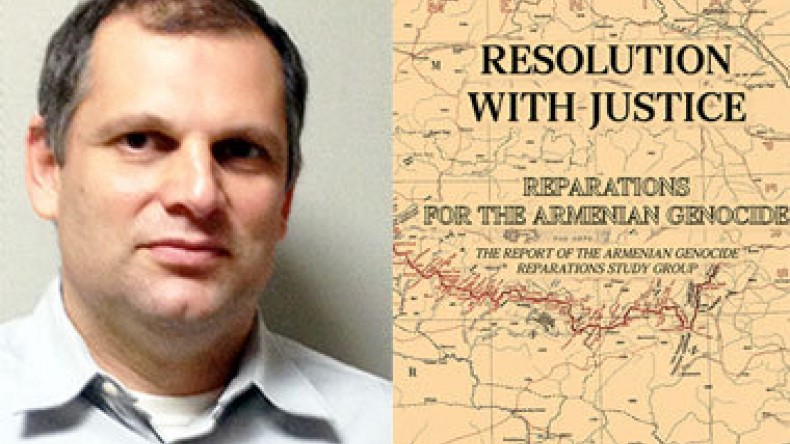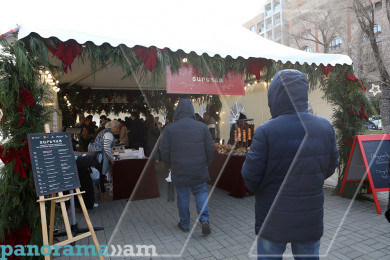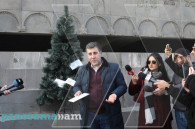
Prof. Theriault on Genocide Reparations Report: Azerbaijan’s treatment of Armenians was the result of Genocide not dealt with
Nvard Chalikyan from Panorama.am has spoken with Professor Henry C. Theriault – Chair of the Armenian Genocide Reparations Study Group (AGRSG) about the recently published report of the Group titled Resolution with Justice: Reparations for the Armenian Genocide (Armenian and English versions of the executive summary and full report are available here).
See Part 1 Henry Theriault: Armenia is suffering from legacy of Genocide; Armenia’s long-term security and viability depend on reparations
Part 2
According to Prof. Theriault, the fact that Azerbaijan thought it was all right to attack Armenians and got away with it, was a direct consequence of the Armenian Genocide not dealt with properly. Among the obstacles to Genocide reparations he mentions Turkish denialism coupled with Turkish anti-Armenianism. He also notes that present-day Turkey is the successor state of the Ottoman Empire and is fully responsible for its acts.
***
Nvard Chalikyan: Prof. Theriault, so from your words can we conclude that the present territory of the Republic of Armenia is not viable for the long-term survival and prosperity of the Armenian people, and that the Genocide reparation is actually a question of security of Armenia and Armenians in the long run?
Dr. Henry Theriault: Yes, absolutely. I must say that I have been incredibly impressed with what Armenians in the Republic have been able to do since 1991. It’s stunning to me that there is a vibrant country there today. At the same time, for its long-term viability more territory is necessary. I do not believe there is a doubt about that, especially because Armenia has hostile countries, Turkey and Azerbaijan, on the either side, while Georgia is not a very good neighbor (think of its treatment of Armenians in Javakhk) and Iran is unpredictable. Armenia thus needs a secure, stable, and adequate territory; it’s absolutely important.
One possibly controversial element of reparations the report puts forward is that a perpetrator state (in this case, Turkey) is actually responsible for the protection of the victim group (in this case, Armenia) until such time as the negative effects of genocide on their security have been repaired and the state is not under threat. Vulnerability is the legacy of genocide, and it is the perpetrator group’s responsibility to ensure that the vulnerability does not result in further harm to the victim group. Thus, beyond simply stopping its anti-Armenian policies or supporting military aggression against Armenians, Turkey must take responsibility and make sure that nothing happens to Armenia.
N.C: (That I believe would require a complete restructuring of Turkey’s current policies which unfortunately seems quite unlikely at this point)… And how do you think the question of Nagorno Karabakh fits within the framework of the Genocide legacy and of the Armenian question as such?
H. Theriault: The first thing to be noted is that there were clear human rights violations as well as massacres against the Armenian minority in Azerbaijan; Azerbaijan was also bombing civilian areas in Karabakh during 1990s. All this never would have happened if the Armenian Genocide had been recognized and dealt with properly. There is no way the global community would have accepted Armenians being targeted in this way by a group that proclaimed its ideological or political connection to Turkey.
The fact that Azerbaijan even thought it was all right to treat and attack Armenians like this and was able to get away with it is a direct consequence of the Genocide not being dealt with. It has to do with impunity and also the apparent acceptability in Turkey and Azerbaijan of not only anti-Armenianism but also of seeing Armenians as legitimate targets of state violence. The Azerbaijani government takes actions that indicate that its leaders think that it is acceptable to kill Armenians.
N.C: According to many critics it is unrealistic to receive reparations (especially territorial ones) from Turkey. In your view what are the major obstacles and challenges in making the reparations package a reality?
H. Theriault: Obviously the biggest problem is Turkish denialism coupled with Turkish anti-Armenianism. There is both a flat refusal of the history and of the obligations that it implies. The anti-Armenian demonstrations that recently took place in Turkey are likewise quite disturbing. If legitimate Armenian concerns and Genocide survivor discussions are met with a popular aggressive response, that means no good public conversation can get started, and that is another major obstacle.
Unfortunately there is also a third obstacle, which is political. There is a real resistance internationally to seeing the legitimacy of reparations and positive ways of addressing the legacies of genocide. Take Guatemala for instance – 30 years have passed after the genocide of about 200,000 Guatemalan indigenous people in 1980s; there has been a truth commission report that detailed the evidence, but the question remains unaddressed. Today’s leaders of Guatemala include some involved with the Genocide, while the victim group has no access to a reparative process; even recognition is not very clear at this point. The 2013 conviction of major perpetrator ex-President Rios Mott was overturned, in fact, and the recent second trial does not appear promising. And case after case of genocide is like that.
I think there is a presumption in our world that victim groups once they are done with have no rights and no recourse because they don’t have power, and it is really all about power. Whereas it is precisely because of the effects of genocide that victim communities are so weak. That is exactly what the international community needs to understand and change.
Actually Armenians are in a better position relative to most groups who have experienced genocide, but what the Armenians have in terms of geopolitical and regional power and material resources is much less than what they would have had had there been no genocide and relative to the resources and power of the often oppositional Turkey that Armenia now has to engage.
N.C: One of the arguments against reparations (that can persist even after Genocide is recognized) is that the modern Republic of Turkey is not responsible for the acts of their Ottoman ancestors. There is also an argument of the passage of time. How valid are these claims?
H. Theriault: A lot of academic work has been done on the first issue in recent years (Professor De Zayas, co-author of the Report, is a specialist on this) all of which without doubt confirm that Turkey is the continuing state or the successor state of the Ottoman Empire. Note that West Germany had responsibility for the Nazi Genocide of the Jews and others, while it was a completely different state. International law is very clear on this.
In this regard I very much appreciate Ungur’s and Polatel’s work because they have actually identified families in Turkey whose resources came from Armenians in the Genocide, so you can trace the direct line and see exactly where their wealth came from; there is no mystery in this.
As for the passage of time argument, 100 years is not even a large number in such cases. Native American groups in the United States to this day suffer from the consequences of the genocide, often after 200 years and more. There are many other cases like this. So this is not a good argument. If consequences of the past harm still affect the victim population today, then it doesn’t matter how much time has passed: the harm is outstanding and must be repaired.
On top of that, an absolutely critical fact is the Genocide did not end in 1918 but continued till 1923, including the burning of Smyrna and other acts. Turkish nationalist forces actually continued the Genocide in the process of creating the Turkish Republic – they prevented Armenians from returning to the places they were deported from, they killed tens of thousands of Armenians, they employed the same genocidal policies, etc. In addition, a number of major Genocide perpetrators became high-ranking figures in the Turkish Republic. It is also worth noting that Turkey continues its anti-Armenian and anti-minority policies to this day, confirming its own connection to the process of genocide that represented the major assault against Armenians, Assyrians, and Greeks.
N.C: Judging from your own experience, how would you say the Turks recognizing the Genocide approach the reparations issue?
H. Theriault: The process typical Turkish people would have to go through to be able to talk about reparations may be very long and complex, given that their government and educational system obviously are doing everything to prevent that.
To be continued…
Interview by Nvard Chalikyan
Newsfeed
Videos






























